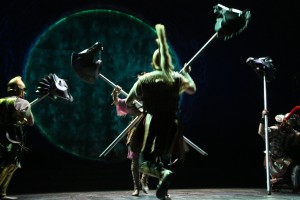

by JK Clarke
It can be argued that the theatergoers who get most excited about a staging of Shakespeare’s little-known and (until recently) seldom performed—and perhaps only partially-authored—Pericles, Prince of Tyre, are those looking to “complete the canon,” and finally lay claim to having seen all of Shakespeare’s plays. In such a quest it’s a happy accident, veritable icing on the cake, if the production is somehow noteworthy and/or entertaining. Fortunately, one can report that Theatre for a New Audience’s production of Pericles at the Polonsky Shakespeare Center manages to make a very satisfying evening of this most unusual and lesser of Shakespeare’s works.


Pericles is a mini-Odyssey of sorts. The eponymous young Phoenician ruler, having ventured abroad to woo the daughter of Antiochus, finds himself in a jam. The king has created a diabolical riddle for his daughter’s suitors. Those who do not solve it are killed (shown with grizzly skulls on pikes at the back of the stage), but the clever Pericles quickly divines its meaning (that Antiochus is having incestuous relations with his daughter) and it both supplants his interest in the princess and makes him the target of the king’s murderous wrath. So, on the advice of counsel, he goes on the run, travelling through many lands and meeting different people: he rescues the people of Tarsus from starvation; then, following a shipwreck which he barely survives, he arrives in Pentapolis where he battles other suitors for the hand of Thaisa, the daughter of the kind King Simonides, who is thrilled to have Pericles for a son-in-law. But just as things seem to be looking up, Pericles is advised that his kingdom badly needs him to return, which he can do safely because Antiochus and his daughter have died. But alas, it’s not to be. While sailing home yet another storm ravages his fleet and his Thaisa “dies” during said storm while giving birth to his daughter Marina. Her watertight coffin washes up on the shores of Ephesus, where she proves to be, in fact, very much alive, unbeknownst to her husband, who has ended up elsewhere. Grief-stricken he leaves his daughter to be raised by the governor of Tarsus and his wife, Dionyza; but, sixteen years later the jealous Dionyza, who wants better suitors for her less beautiful and popular daughter, orders Marina’s murder. But Marina is kidnapped by pirates (yes, really) and sold into prostitution in a Mytilene brothel. However, she converts every customer who comes for her to more moral ways because she is so chaste, innocent and beatific. When, sixteen years later, Pericles returns to Tarsus to find her he is told she is dead, and so he wanders again, heartbroken. By happenstance he finds her in Mytilene and not long after finds his supposedly dead wife as well.


A fabulous and unbelievable tale if there ever was one (in every sense of the term), there has never been a more pressing need in Shakespeare than in this play to suspend disbelief. It is only through acclaimed English director Trevor Nunn’s elaborate and elegant staging that Pericles becomes a palatable play. Nunn stays true to the text, editing very little. Though it’s a gamble that often fails in other productions of the Bard’s works, he has successfully turned many of Shakespeare’s speeches into beautifully performed songs (neither intrusive nor awkward), augmented by the hip and innovative PigPen Theatre Company. Along with the songs, Nunn has embraced the grand epic storyline of Pericles through his use of the impressive Raphael Nash Thompson as the poet/narrator John Gower, who, with a deep, rich voice both introduces the play and acts as narrator, filling in gaps of time and information, which provides us with an easy-to-follow narrative. With other characters tweaked for comic relief, such as the animated and hilarious John Rothman as Simonides, King of Pentapolis, who couldn’t be more thrilled that a stud like Pericles (a moody and melodramatic Christian Camarago) is a match for his daughter, Thaisa (Gia Crovatin). Camarago—who was a far more excellent Mercutio in the otherwise lackluster 2013 Romeo and Juliet on Broadway— is uneven here, as he orates to the heavens like Captain Kirk in one scene, then is mumbling and melancholy in the next; part of which, no doubt, is the fault of the text.


The real saviors of the production, however, are Robert Jones for his absolutely stunning set that featured a versatile and ever-changing circular backdrop (from raging sea to pacific moon to live action/big screen crystal ball) bathed in soft, pleasing hues (thanks also to Stephen Strawbridge’s luscious lighting); and practically imperceptible set changes to create new rooms/countries by dropping down exotic middle eastern lamps and creating a mythical and sumptuous harem; or moving in a large ship while other action takes place in the foreground. The sets are rivaled only by Constance Hoffman’s magnificent and elegant costumes, from the serpentine and spiny bronze gowns of Antiochcus and his daughter to the multi-national jousting armour of Thaisa’s suitors to Simonides and Thaisa’s innocent, white Grecian robes. Just taking in the visual spectacle in this production is satisfying enough, but the overall presentation is quite pleasing, as there are no seriously detracting elements.
You’d be hard pressed to find a Shakespeare devotee who lists Pericles anywhere near their top ten favorites list, but Trevor Nunn and company have taken an ostentatious play that features hints of Shakespeare’s notoriously beautiful speeches and turned it into a lovely and entertaining production that’s as worth seeing as any great play. It’s beautiful to look at, easy to follow and, for those who care, helps check off one of the remaining holdouts on a Complete Works scorecard in a very satisfactory fashion.
Pericles. Extends thru April 10th at Theatre for a New Audience Polonsky Shakespeare Center (262 Ashland Place, Brooklyn). www.tfana.org
*Photos by Gerry Goodstein





















